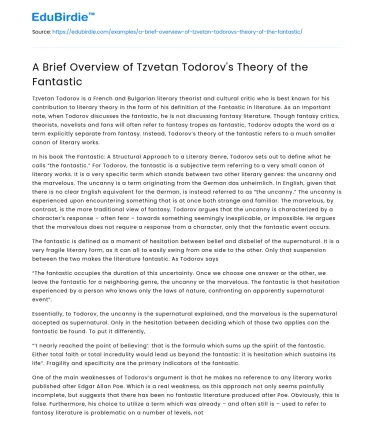Tzvetan Todorov is a French and Bulgarian literary theorist and cultural critic who is best known for his contribution to literary theory in the form of his definition of the Fantastic in literature. As an important note, when Todorov discusses the fantastic, he is not discussing fantasy literature. Though fantasy critics, theorists, novelists and fans will often refer to fantasy tropes as fantastic, Todorov adopts the word as a term explicitly separate from fantasy. Instead, Todorov’s theory of the fantastic refers to a much smaller canon of literary works.
In his book The Fantastic: A Structural Approach to a Literary Genre, Todorov sets out to define what he calls “the fantastic.” For Todorov, the fantastic is a subjective term referring to a very small canon of literary works. It is a very specific term which stands between two other literary genres: the uncanny and the marvelous. The uncanny is a term originating from the German das unheimlich. In English, given that there is no clear English equivalent for the German, is instead referred to as “the uncanny.” The uncanny is experienced upon encountering something that is at once both strange and familiar. The marvelous, by contrast, is the more traditional view of fantasy. Todorov argues that the uncanny is characterized by a character’s response – often fear – towards something seemingly inexplicable, or impossible. He argues that the marvelous does not require a response from a character, only that the fantastic event occurs.
Save your time!
We can take care of your essay
- Proper editing and formatting
- Free revision, title page, and bibliography
- Flexible prices and money-back guarantee
The fantastic is defined as a moment of hesitation between belief and disbelief of the supernatural. It is a very fragile literary form, as it can all to easily swing from one side to the other. Only that suspension between the two makes the literature fantastic. As Todorov says
“The fantastic occupies the duration of this uncertainty. Once we choose one answer or the other, we leave the fantastic for a neighboring genre, the uncanny or the marvelous. The fantastic is that hesitation experienced by a person who knows only the laws of nature, confronting an apparently supernatural event”.
Essentially, to Todorov, the uncanny is the supernatural explained, and the marvelous is the supernatural accepted as supernatural. Only in the hesitation between deciding which of those two applies can the fantastic be found. To put it differently,
“‘I nearly reached the point of believing’: that is the formula which sums up the spirit of the fantastic. Either total faith or total incredulity would lead us beyond the fantastic: it is hesitation which sustains its life”. Fragility and specificity are the primary indicators of the fantastic.
One of the main weaknesses of Todorov’s argument is that he makes no reference to any literary works published after Edgar Allan Poe. Which is a real weakness, as this approach not only seems painfully incomplete, but suggests that there has been no fantastic literature produced after Poe. Obviously, this is false. Furthermore, his choice to utilize a term which was already – and often still is – used to refer to fantasy literature is problematic on a number of levels, not the least of which is the resultant confusion over terminological distinctions and specifications. When someone refers to an event as “fantastic” or “fantastical,” chances are that they are referring not to Todorov’s fantastic, but to fantasy in general. If anything, rather than enlightening, Todorov’s theory has done little more than obfuscate. Nevertheless, his contributions to the development of genre theory and methodology are vital, despite the work's shortcomings.






 Stuck on your essay?
Stuck on your essay?

